BT customers pay highest exit fees to escape inflation-busting price rises

BT broadband customers are paying the highest exit fees to escape double-digit price rises due to kick in from April.
Home internet users are facing bill increases of as much as 14pc, amounting to more than £50 a year on average.
But BT, which is being investigated by the telecoms watchdog over the notice it gave customers of the hikes, also charges customers who want to leave mid-contract the highest fee of the biggest providers.
The average BT customer would have to pay £219 on average to leave their contract early, according to Which?, the consumer group.
Their bills will increase in April by an average of £66 a year – or 14.4pc.
Many broadband firms – such as BT, EE, Plusnet, Shell Energy Broadband, TalkTalk and Vodafone – raise prices every April in line with the consumer prices index plus an additional 3 to 4 percentage points.
These rises are often applied in the middle of contracts, which typically last 18 or 24 months.
The BT Group, which also owns brands EE and Plusnet, has confirmed that it will go ahead with 14.4pc price rises for most of their customers.
Shell Energy Broadband customers would face the second-highest exit penalties, at £160 on average, followed by EE and Plusnet customers, who would pay £150 and £145 respectively.
TalkTalk customers pay the lowest exit fees at £122, while Vodafone customers are charged £124.
EE customers are facing the highest price rises in April, at £67 a year on average.
Vodafone, TalkTalk and Plusnet customers could pay an extra £55, £54 and £53 a year respectively. For Shell Energy Broadband, the increase was £50.
Rocio Concha, of Which?, said: “It’s hugely concerning that many broadband customers could find themselves trapped in a lose-lose situation where they either have to accept exorbitant – and difficult to justify – mid-contract price hikes this spring or pay costly exit fees to leave their contract early and find a better deal.”
Which? is calling on providers to let their customers leave without penalty if they face mid-contract price rises.
Ofcom, the regulator, is currently investigating whether mid-contract price rises were set out clearly enough to customers before they signed up.
Many broadband customers already saw their bills go up by 10pc last year.
Not all broadband providers are putting their customers in this situation. Sky and Virgin traditionally allow customers to haggle or leave their contracts when they levy mid-contract price rises. Zen Internet, Hyperoptic and SSE promise not to raise prices during customers’ minimum contract period.
A spokesman for the BT Group said: “We take seriously our responsibility to ensure our services are accessible to the widest group of customers possible through our market leading social tariffs. We are balancing our own rising costs due to high inflation and making vital digital infrastructure investments for the UK.”
Shell Energy Broadband said it has a £20m “help fund” to support the most vulnerable, and will assist with payment plans or moving customers to a cheaper tariff whenever possible.
A TalkTalk spokesman said Ofcom could do more to block price rises across the market.
Vodafone declined to comment.
Find a broadband deal with no exit fees with Telegraph Compare

 Yahoo Finance
Yahoo Finance 